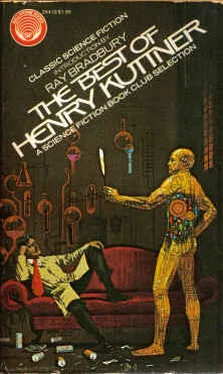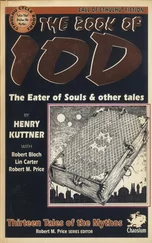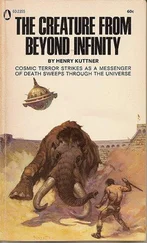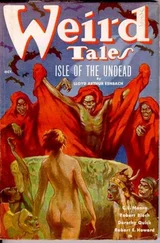“I’m sorry, Tim,” Worth said. “It’s too late now, though. There won’t be any trouble. You’ve got a right to go by our office records.”
“Stop me now,” Carmichael said. “Lousy little—” He was angry and drunk On impulse he got another taxi and sped to the printer’s, still trailing a somewhat confused Jerry Worth.
There was rhythmic thunder in the building. The swift movement of the taxi had given Carmichael a slight nausea; his head ached, and alcohol was in solution in his blood. The hot, inky air was unpleasant. The great Linotypes thumped and growled. Men were moving about. It was all slightly nightmarish, and Carmichael doggedly hunched his shoulders and lurched on until something jerked him back and began to strangle him.
Worth started yelling. His face showed drunken terror. He made ineffectual gestures.
But this was all part of the nightmare. Carmichael saw what had happened. The ends of his scarf had caught in the moving gears somewhere and he was being drawn inexorably into meshing metal cogs.
Men were running. The clanking, thumping, rolling sounds were deafening. He pulled at the scarf.
Worth screamed, “… knife! Cut it!”
The warping of relative values that intoxication gives saved Carmichael. Sober, he would have been helpless with panic. As it was, each thought was hard to capture, but clear and lucid when he finally got it. He remembered the shears, and he put his hand in his pocket. The blades slipped out of their cardboard sheath, and he snipped through the scarf with fumbling, hasty movements.
The white silk disappeared. Carmichael fingered the ragged edge at his throat and smiled stiffly.
Mr. Peter Talley had been hoping that Carmichael would not come back. The probability lines had shown two possible variants; in one, all was well; in the other…
Carmichael walked into the shop the next morning and held out a five-dollar bill. Talley took it.
“Thank you. But you could have mailed me a check”
“I could have. Only that wouldn’t have told me what I wanted to know.”
“No,” Talley said, and sighed. “You’ve decided, haven’t you?”
“Do you blame me?” Carmichael asked. “Last night-do you know what happened?”
“Yes.”
“How?”
“I might as well tell you,” Talley said. “You’d find out anyway. That’s certain, anyhow.”
Carmichael sat down, lit a cigarette and nodded. “Logic. You couldn’t have arranged that little accident, by any manner of means. Betsy Hoag decided to break our date early yesterday morning.
Before I saw you. That was the beginning of the chain of incidents that led up to the accident. Ergo, you must have known what was going to happen.”
“I did know.”
“Prescience?”
“Mechanical. I saw that you would be crushed in the machine—”
“Which implies an alterable future.”
“Certainly,” Talley said, his shoulders slumping. “There are innumerable possible variants to the future. Different lines of probability. All depending on the outcome of various crises as they arise. I happen to be skilled in certain branches of electronics. Some years ago, almost by accident, I stumbled on the principle of seeing the future.”
“How?”
“Chiefly it involves a personal focus on the individual. The moment you enter this place”-he gestured—“you’re in the beam of my scanner. In my back room I have the machine itself. By turning a calibrated dial, I check the possible futures. Sometimes there are many. Sometimes only a few. As though at times certain stations weren’t broadcasting. I look into my scanner and see what you need-and supply it.”
Carmichael let smoke drift from his nostrils. He watched the blue coils through narrowed eyes.
“You follow a man’s whole life-in triplicate or quadruplicate or whatever?”
“No,” Talley said. “I’ve got my device focused so it’s sensitive to crisis curves. When those occur, I follow them farther and see what probability paths involve the man’s safe and happy survival.”
“The sunglasses, the egg and the gloves—”
Talley said, “Mr.-uh-Smith is one of my regular clients. Whenever he passes a crisis successfully, with my aid, he comes back for another checkup. I locate his next crisis and supply him with what he needs to meet it. I gave him the asbestos gloves. In about a month, a situation will arise where he must-under the circumstances-move a red-hot bar of metal. He’s an artist. His hands—”
“I see. So it isn’t always saving a man’s life.”
“Of course not,” Talley said. “Life isn’t the only vital factor. An apparently minor crisis may lead to-well, a divorce, a neurosis, a wrong decision and the loss of hundreds of lives indirectly. I insure life, health and happiness.”
“You’re an altruist. Only why doesn’t the world storm your doors? Why limit your trade to a few?”
“I haven’t got the time or the equipment.”
“More machines could be built.”
“Well,” Talley said, “most of my customers are wealthy. I must live.”
“YOU could read tomorrow’s stock-market reports if you wanted dough,” Cannichael said. “We get back to that old question. If a guy has miraculous powers, why is he satisfied to run a hole-in-the-wall store?”
“Economic reasons. I-ah-I’m averse to gambling.”
“It wouldn’t be gambling,” Carmichael pointed out. “I often wonder what the vintners buy…’ Just what do you get out of this?”
“Satisfaction,” Talley said. “Call it that.”
But Carmichael wasn’t satisfied. His mind veered from the question and turned to the possibilities.
Insurance, eh? Life, health and happiness.
“What about me? Won’t there be another crisis in my life sometime?”
“Probably. Not necessarily one involving personal danger.”
“Then I’m a permanent customer.” I-don t- “Listen,” Carmichael said, “I’m not trying to shake you down. I’ll pay.
I’ll pay plenty. I’m not rich, but I know exactly what a service like this would be worth to me. No worries—”
“It couldn’t be—”
“Oh, come off it. I’m not a blackmailer or anything. I’m not threatening you with publicity, if that’s what you’re afraid of. I’m an ordinary guy, not a melodramatic villain. Do I look dangerous? What are you afraid of?”
“You’re an ordinary guy, yes,” Talley admitted. “Only—”
“Why not?” Carmichael argued. “I won’t bother you. I passed one crisis successfully, with your help.
There’ll be another one due sometime. Give me what I need for that. Charge me anything you like. I’ll get the dough somehow. Borrow it, if necessary. I won’t disturb you at all. All I ask is that you let me come in whenever I’ve passed a crisis, and get ammunition for the next one. What’s wrong with that?”
“Nothing,” Talley said soberly.
“Well, then. I’m an ordinary guy. There’s a girl-it’s Betsy Hoag. I want to marry her. Settle down somewhere in the country, raise kids and have security. There’s nothing wrong with that either, is there?”
Talley said, “It was too late the moment you entered this shop today.”
Carmichael looked up. “Why?” he asked sharply.
A buzzer rang in the back. Talley went through the curtains and came back almost immediately with a wrapped parcel. He gave it to Carmichael.
Carmichael smiled. “Thanks,” he said. “Thanks a lot. Do you have any idea when my next crisis will come?”
“In a week.”
“Mind if I—” Carmichael was unwrapping the package. He took out a pair of plastic-soled shoes and looked at Talley, bewildered.
“Like that, eh? I’ll need-shoes?”
“Yes.”
“I suppose—” Carmichael hesitated. “I guess you wouldn’t tell me why?”
Читать дальше







